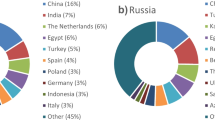Abstract
This paper focuses on the positions taken by civil society organisations that actively campaign on trade policies. Trade campaigners oppose the neo-liberal approach to trade and development and advocate a much more gradual and prudent approach to trade liberalisation. They stress that trade liberalisation will only lead to sustainable development if it respects environmental and social concerns, including the gender dimension of trade; if trade liberalisation is properly owned, prepared and sequenced; adapted to the institutional and economic needs and capacities of the countries and people involved, and accompanied by all necessary flanking measures. Trade campaigners stress the need to maintain policy space and the necessary governance instruments to react to changing circumstances and address social and environmental concerns. They denounce the lack of information, consultation and participation provided by governments in trade policy formulation and negotiations and they campaign to raise awareness and create more room for debate and participation.
Similar content being viewed by others
Notes
The European Commission categorises business associations and trade unions as civil society together with NGOs and CBO’s (community based organisations). See Wichterich (2008c) for a discussion about the definitions of civil society.
Compare for instance the list of active members of the European Seattle2Brussels network with (footnote 4) with the signatories of the statement “Immediately Halt EU-India FTA negotiations. Statement of concern from India”, New Delhi, 21 September 2008.
For a short overview of the scholarly discussion on trade and development and a critique of the neo-liberal approach, see for instance Gavin (2007).
References
Bernardino N (2007) Gender implications of the European Union–ASEAN free trade agreement. WIDE, Brussels
Call (2008) A call to ASEAN leaders regarding the proposed EU–ASEAN free trade agreement negotiations from the Southeast Asian peoples caucus on EU–ASEAN FTA held in Quezon City, Philippines on 23–24 June 2008, http://www.focusweb.org/philippines/content/view/147/2/
CEC (2006) Global Europe—competing in the world—a contribution to the EU's growth and job strategy, COM (2006) 567, 4th October, Brussels
Chang H-J (2005) Kicking away the ladder: “Good Policies” and “Good Institutions” in historical perspective. In: Gallagher KP (ed) Putting development first: the implications of policy space in the WTO and the International Financial Institutions. Zed Books, London
Gavin B (2007) The EU–ACP economic partnership agreements: What impact on development? Trinity College, International institute of Integration Studies (IIIS), Dublin
Halt (2008) “Immediately Halt EU–India FTA negotiations. Statement of concern from India”, New Delhi, 21 September 2008, www.bilaterals.org > EU–India
IPC (2008) Civil society statement on the world food emergency: no more “Failures-as-Usual”! Rome, May 2008, http://www.nyeleni.eu/foodemergency/
Jones E, Rice T, Weller C (2008) EU FTA manual. Action aid-christian aid-Oxfam international
Kijitiwatchakul K (2008) Thai struggles against FTAs. Presentation a the round table discussion on EU–ASEAN FTA, Hanoi, 6–7 October 2008. Bangkok, FTA Watch
Maes M (2007) The EU approach to FTA talks with ASEAN, India, Korea, South–North development monitor SUNS, 72, 6171, 18 January 2007
Maurer A (2005) The role of parliaments in scrutinising and influencing trade policy. A comparative analysis. Report by the German Institute for International and Security Affairs. Berlin, 2005/Brussels, European Parliament, EP/ExPol/B/2005/09
Nyeleni (2007) Developing and strengthening the concept of peoples' food sovereignty, http://www.nyeleni2007.org/spip.php?article48
Oxfam International (2006) Signing away the future: how trade and investment agreements between rich and poor countries undermine development
Polaski S, Ganesh-Kumar A, McDonald S, Panda M, Robinson S (2008) India’s trade policy choices: managing diverse challenges, Carnegie Endowment for International Peace, Institute of Development Studies and Indira Gandhi Institute of development research
Powel S (2008) The EU–Indie FTA: initial observations form a development perspective. Traidcraft, London
Purugganan J (2007) Global Europe and ASEAN. Influence of EU's competitiveness strategy on Southeast Asia. Paper presented at the alternative G8 summit in Rostock, 5–7 June 2007. Manila, Focus on the Global South
Raman M, Poppe C (2008) Climate change and international trade: the need for a paradigm shift, in PSE. Inclusion of social and environmental standards in free trade agreements. New thinking on trade and development, Brussels
Rezzin M (2008) Advocating for gender equality within EU India trade negotiations: are they listening? Brussels, WIDE, 2008 (http://www.wide-network.org/index.jsp?id=382)
S2B (2006) The new ‘Global Europe’ strategy of the EU: serving corporations worldwide and at home. A wake-up call to civil society and trade unions in Europe and elswhere. Brussels, S2B, November 2006. www.s2bnetwork.org
Stop (2007) Stop the Korea–EU FTA negotiations! Statement by the Korean alliance against Koea–US/EU FTAs, Seoul, 13 July 2007
UNCTAD (2007) Trade and development report, 2007: Regional cooperation for development, Geneva, UNCTAD
Wichterich C (2007) Economic growth without social justice: EU–India trade negotiations and their implications for social development and gender justice. Brussels, WIDE
Wichterich C (2008a) EU–India Free Trade Talks: In Whose interest? Market access at the expense of the people, World economy and development in brief, Issue 1, Jan–Feb 2008
Wichterich C (2008b) Opinion from the European Civil Society. Presentation at the multi-stakeholder dialogue on the current negotiations of the ASEAN/EU FTA, organised by the Friedrich Ebert Foundation in Bangkok, on 14 February 2008.
Wichterich C (2008c) EU–China partnership and cooperation agreement. WIDE, Brussels
Wichterich C (2008d) GATI Interview, gender and trade newsletter, Issue IV, February–April 2008, www.genderandtrade.org > news
WOW (2008) War on want. Global Europe: the European Union's double attack on developing countries and the European social model. London, April 2008
Author information
Authors and Affiliations
Corresponding author
Additional information
This article builds on a paper presented on 19-20 June 2008 at an UNU-CRIS Work Shop in Bruges on “Deep Integration and North-South Free Trade Agreements. EU Strategy for a Global Economy”.
Rights and permissions
About this article
Cite this article
Maes, M. Civil society perspectives on EU–ASIA free trade agreements. Asia Eur J 7, 97–107 (2009). https://doi.org/10.1007/s10308-008-0216-9
Published:
Issue Date:
DOI: https://doi.org/10.1007/s10308-008-0216-9



